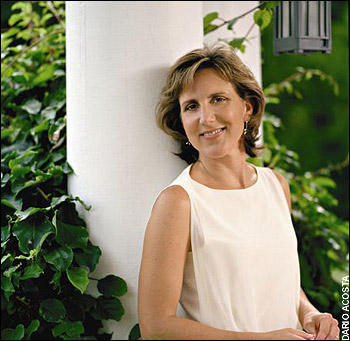Cancer hasn't stopped Dawn Upshaw inspiring composers. By Peter Culshaw
The soprano Dawn Upshaw arranges a meeting in one of her favourite coffee shops in Manhattan - a place as unpretentious as she is. As I greet her, I congratulate her on becoming a genius.
 | |
Last year she won a MacArthur Fellowship, worth half a million dollars, which are given to a select few every year and universally known as the "genius grants".
"It was a wonderful pat on the back," she replies.
"When I'm feeling down I think about it and cheer myself up."
The foundation praised her as a "catalyst for the creation of numerous works", and for "breaking down stylistic barriers and forging a new model of a performer".
The news was a welcome boost after a very difficult couple of years for Upshaw: she was diagnosed with breast cancer in 2006. She is now free of the disease and is performing to tremendous reviews.
"It's gone, as far as I know right now," she says.
"For a period of time the treatment takes over your life. Luckily they caught it very early." How does she feel after the ordeal? "Good. I found it to be true what people say - your priorities seem clearer, and you realise the importance of family and friends."
For years, Upshaw has been involved in many of the most high-profile contemporary classical works, from Górecki's million-selling Third Symphony to John Adams's nativity oratorio, El Niño, and Kaija Saariaho's shimmering L'Amour du loin.
If she isn't commissioning work, she often shapes the pieces: Saariaho rewrote some of L'Amour du loin at Upshaw's urging, and Adams ran his oratorio past her and took some suggestions.
When I meet her, she is enthusing about an opera written at her behest by the British-based composer David Bruce for the graduate students she teaches at Bard Conservatory.
"It was based on a wonderful Russian folk tale - it was thrilling."
This week sees Upshaw at the Barbican in London performing in a concert version of Osvaldo Golijov's first opera Ainadamar ("Fountain of Tears") - she plays Margarita Xirgu, an actress and the lover of the Spanish poet Lorca. The melodic, flamenco-tinged opera has Xirgu reflecting and regretting the events surrounding Lorca's murder in 1936.
Golijov got a big break when Upshaw, on receipt of a grant, rang her friend David Harrington of the Kronos Quartet, who suggested she commission him to write something. The result, St Mark's Passion, proved to be his breakthrough piece.
Last year Golijov had four CDs in the classical charts in the US. He has said of his favoured muse: "I don't compose for her. Sometimes I feel that she's composing me."
I mention that Golijov, while feted in the States, has had a more mixed critical reaction here.
Upshaw replies: "I know he brings something without artifice that is true and beautiful and touches a lot of people - maybe it's just too enjoyable."
The opposite of Golijov's ebullience was La Passion de Simone, the Saariaho piece in which Upshaw made her most recent British appearance, which tells the story of the suicide of the writer Simone Weil.
"I got my diagnosis just weeks before we started working on it," she says.
"It's such a dark piece I had trouble taking myself there. I feel stronger emotionally and I'm looking forward to doing it again. Golijov and Saariaho couldn't be more different - they belong in different galaxies - but I feel a strong connection to both." Saariaho's new opera, Adriana Mater, premieres at the Barbican this month.
Another composer close to Upshaw is Adams ("Singing his El Niño was one of the greatest musical experiences of my life"). The other soprano in that piece was Upshaw's friend Lorraine Hunt Lieberson, who succumbed to the same cancer that Upshaw has fought.
"She was definitely my favourite singer," says Upshaw, "in a class by herself. I saw her for the last time at the Carnegie Hall when she sung the gorgeous Neruda songs composed by her husband Peter. She looked wonderful and sounded magnificent. A few of us crowded in her dressing room to drink champagne and celebrate. She died on July 3, 2006, and I was diagnosed the first week of August."
Upshaw came to prominence as a more conventional opera singer, making more than 300 appearances at the Met.She used to say she wanted to split contemporary music and the classics 50-50, but "it hasn't been that way for quite a time. Singing Susanna in The Marriage of Figaro was one of the great joys of my life, it was a great time, but I don't think anyone would hire me now. I'm not sad about that."
The lure of the new and her role as catalyst seems to be ever more seductive for her. So how is she going to spend her MacArthur money? I'm not surprised when, true to the spirit of the award, she says she has kept it aside to commission new music.
When a magazine recently asked me to provide a list of the top opera divas of the world, names like Gheorghiu, Dessay, Netrebko and Fleming fitted the bill but, somehow, the word diva doesn't seem to apply to the down-to-earth Upshaw.
"Sometimes I get called a diva - just not by anyone who knows me."

|
Recent news items |
Most popular posts |
All works are available through billholabmusic.com. |